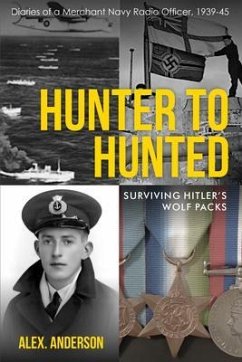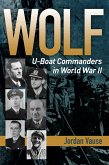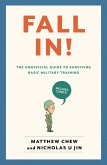Early 1939 saw a world already in turmoil and Great Britain enter deeper into a period of momentous political upheaval and decision-making around the growing threat of a second World War. That said, daily life went on, and so it was for a nineteen-year-old Perthshire lad, son of the local headmaster and one of four siblings, who had just graduated from Dundee's Wireless College and was embarking on a career as a Radio Officer in the Merchant Navy.
Accompanied by his father, Alex Anderson signed-on his first voyage at the age of nineteen, at the offices of Christian Salvesen, in Leith, Scotland and became a participant in the S.S. New Sevilla Whaling Expedition to the Antarctic, 1939/40 Season. From day one, he started to experience the vagaries associated with a working life at sea, far from his comfortable home life in rural Perthshire. Hardships abound, but fascinating sights and experiences were equally plentiful which, together with a fascination for far-off places, provided the necessary counterbalance. Schoolboy heroes like 'Scott of the Antarctic' and Sir Ernest Shackleton were brought closer to home when seeing first-hand Shackleton's memorial site at Grytviken as well as being up close to icebergs, pack-ice and experiencing all manner of the Antarctic's notorious weather conditions.
Together with an almost daily pre-occupation with what was being served up in the Mess (or saloon) at mealtimes, the weather was the other topic of much comment, not least that it directly impacted on their whale quota, but lives also depended on it. Dangers from the elements were a constant, whether from simply negotiating the decks to scraping ice from the aerials atop the radio room shack on one of the small whale Catchers, the workhorses of the whaling fleet.
The rest of the world had moved on. As the six-month expedition, so far from the growing European theatre of conflict, came to a close, the return voyage focussed on new threats, U-Boats! Alex's first time at sea would be his last in peacetime. The North Atlantic became the next hunting-ground where merchant shipping, rather than whales would now be the 'hunted'.
For the next five and a half years, until his discharge from war service as a de facto RN officer, Alex would serve on a further six vessels supplying Great Britain and the Allied effort with everything from oil to fighter planes, coal to invasion barges, often in convoys numbering over one hundred vessels. However, on occasions, weather, engine damage or even the holding of an onboard burial (at sea), meant being separated from the convoy and the all-important naval escorts. Left at the mercy of Hitler's Wolf Packs, the tables had well and truly turned.
Despite the times, the hardships and solemn war-time news there was also humour, new friendships, romance and all of life's experiences still going on. This provided a wide range of anecdotes meticulously captured in diary entries, along with a plethora of photographs and souvenirs, gathered along the way. From those met on far-off shores with connections as close as the next village to a ship mate come artist recruited by Naval Intelligence for clandestine propaganda duties in Cairo. The UK's first female registered marine engineer, God-daughter of Queen Victoria, an MBE and the first ever female recipient of a Lloyd's War Medal for bravery shared the same hotel whilst sheltering after an aerial attack.
With daily dangers at sea, any chance of leave when back in British ports were eagerly taken up
Accompanied by his father, Alex Anderson signed-on his first voyage at the age of nineteen, at the offices of Christian Salvesen, in Leith, Scotland and became a participant in the S.S. New Sevilla Whaling Expedition to the Antarctic, 1939/40 Season. From day one, he started to experience the vagaries associated with a working life at sea, far from his comfortable home life in rural Perthshire. Hardships abound, but fascinating sights and experiences were equally plentiful which, together with a fascination for far-off places, provided the necessary counterbalance. Schoolboy heroes like 'Scott of the Antarctic' and Sir Ernest Shackleton were brought closer to home when seeing first-hand Shackleton's memorial site at Grytviken as well as being up close to icebergs, pack-ice and experiencing all manner of the Antarctic's notorious weather conditions.
Together with an almost daily pre-occupation with what was being served up in the Mess (or saloon) at mealtimes, the weather was the other topic of much comment, not least that it directly impacted on their whale quota, but lives also depended on it. Dangers from the elements were a constant, whether from simply negotiating the decks to scraping ice from the aerials atop the radio room shack on one of the small whale Catchers, the workhorses of the whaling fleet.
The rest of the world had moved on. As the six-month expedition, so far from the growing European theatre of conflict, came to a close, the return voyage focussed on new threats, U-Boats! Alex's first time at sea would be his last in peacetime. The North Atlantic became the next hunting-ground where merchant shipping, rather than whales would now be the 'hunted'.
For the next five and a half years, until his discharge from war service as a de facto RN officer, Alex would serve on a further six vessels supplying Great Britain and the Allied effort with everything from oil to fighter planes, coal to invasion barges, often in convoys numbering over one hundred vessels. However, on occasions, weather, engine damage or even the holding of an onboard burial (at sea), meant being separated from the convoy and the all-important naval escorts. Left at the mercy of Hitler's Wolf Packs, the tables had well and truly turned.
Despite the times, the hardships and solemn war-time news there was also humour, new friendships, romance and all of life's experiences still going on. This provided a wide range of anecdotes meticulously captured in diary entries, along with a plethora of photographs and souvenirs, gathered along the way. From those met on far-off shores with connections as close as the next village to a ship mate come artist recruited by Naval Intelligence for clandestine propaganda duties in Cairo. The UK's first female registered marine engineer, God-daughter of Queen Victoria, an MBE and the first ever female recipient of a Lloyd's War Medal for bravery shared the same hotel whilst sheltering after an aerial attack.
With daily dangers at sea, any chance of leave when back in British ports were eagerly taken up
Dieser Download kann aus rechtlichen Gründen nur mit Rechnungsadresse in A, D ausgeliefert werden.









